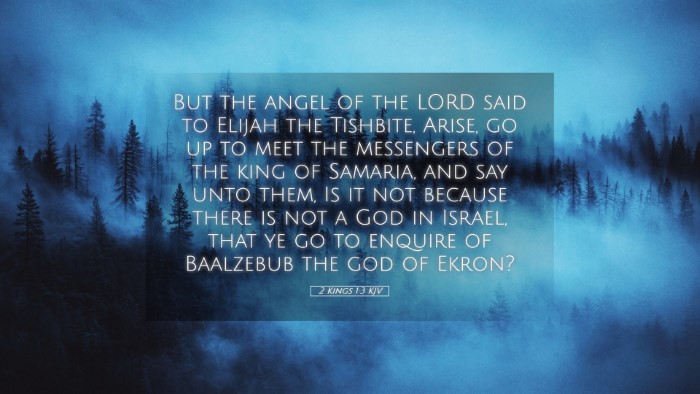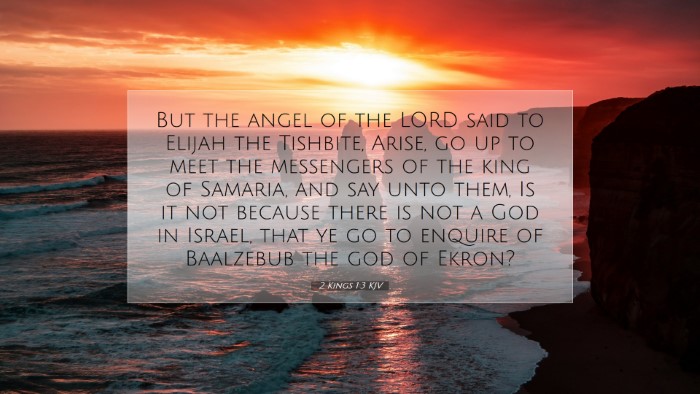Old Testament
Genesis Exodus Leviticus Numbers Deuteronomy Joshua Judges Ruth 1 Samuel 2 Samuel 1 Kings 2 Kings 1 Chronicles 2 Chronicles Ezra Nehemiah Esther Job Psalms Proverbs Ecclesiastes Song of Solomon Isaiah Jeremiah Lamentations Ezekiel Daniel Hosea Joel Amos Obadiah Jonah Micah Nahum Habakkuk Zephaniah Haggai Zechariah Malachi2 Kings 1:3
2 Kings 1:3 KJV
But the angel of the LORD said to Elijah the Tishbite, Arise, go up to meet the messengers of the king of Samaria, and say unto them, Is it not because there is not a God in Israel, that ye go to enquire of Baalzebub the god of Ekron?
2 Kings 1:3 Bible Commentary
Commentary on 2 Kings 1:3
Verse Reference: 2 Kings 1:3 - "But the angel of the LORD said to Elijah the Tishbite, 'Arise, go up to meet the messengers of the king of Samaria, and say unto them, Is it not because there is not a God in Israel, that ye go to inquire of Baalzebub, the god of Ekron?'
This verse presents a pivotal moment in the narrative of Elijah, illustrating the tension between Yahweh worship and idolatry, particularly the worship of Baal represented by the Philistine god Baalzebub. It serves as a profound theological statement against seeking answers from sources outside God, reflecting not only on the Israelites' relationship with Yahweh but also providing significant insights for contemporary believers.
Exegesis and Context
To fully understand 2 Kings 1:3, we must examine its context. After Ahab's death, his son Ahaziah, king of Israel, falls through a lattice in his upper chamber and becomes seriously ill. In search of healing, he sends messengers to inquire of Baalzebub, the god of Ekron, instead of seeking counsel from the God of Israel.
The prophetic response through Elijah signifies God’s disapproval of Ahaziah’s actions. This encounter underscores the significance of maintaining exclusive worship of Yahweh and highlights the futility of seeking help from false gods.
Insights from Matthew Henry
Matthew Henry emphasizes the folly of Ahaziah's inquiry due to his neglect of Yahweh. He notes that God is a jealous God who demands exclusive devotion from His people. The inquiry to Baalzebub symbolizes the heart's inclination towards idolatry when faced with adversity. Henry suggests that God’s direct communication through Elijah serves as a reminder that true healing and guidance can only come from the Lord.
- The Nature of God: Henry expounds on God's sovereignty and omnipresence, which render the consultation with Baal absurd.
- Divine Intervention: The passage reflects God's willingness to intervene in human affairs, demonstrating His concern for His people even when they stray.
Insights from Albert Barnes
Albert Barnes provides an analytical perspective on this verse, focusing on the implications of Ahaziah’s decision. Barnes highlights that the question posed by Elijah was rhetorical, showcasing the incredulity of seeking aid from an idol when the true God was available. He underscores the following points:
- The Importance of Faithfulness: Barnes argues that loyalty to God during trials is critical, and turning to idolatrous practices reflects a lack of faith.
- Message of Judgment: The message delivered to Ahaziah serves as a judgment against his unfaithfulness and a call back to true worship.
Insights from Adam Clarke
Adam Clarke elaborates on the cultural implications of the gods worshipped in Israel's environment. He provides historical context regarding Ekron and its deity Baalzebub, known as the 'Lord of the Flies.' Clarke discusses the dangers of syncretism and the influence of surrounding cultures on Israel's worship practices. He underlines several critical observations:
- Cultural Influence: Clarke notes how the Israelites often succumbed to the pagan practices of neighboring nations, compromising their faith.
- Prophetic Authority: The command for Elijah to confront Ahaziah emphasizes the role of prophets as servants of God, bringing forth His word with authority and urgency.
Theological Implications
The repeated theme of fidelity to Yahweh throughout the Old Testament finds a particular resonance in this passage. Ahaziah’s decision represents a broader struggle between faithfulness and idolatry, common in the lives of many believers today. The verse invites reflection on the sources from which we seek wisdom and guidance.
Key Themes:
- God’s Sovereignty: The notion that God is the ultimate source of healing and guidance.
- Warning Against Idolatry: The severe warning against looking elsewhere for answers in times of desperation.
- Call to Repentance: The challenge for believers to return to exclusive devotion to God rather than compromise with cultural idols.
Application for Modern Readers
For pastors, students, theologians, and biblical scholars, 2 Kings 1:3 provides a profound exploration of human nature and our propensity to seek answers outside of God's will. It calls believers to examine their hearts for modern-day idols or distractions that might divert their attention from reliance on God.
Moreover, the passage encourages a deeper understanding of the prophetic role as a vital voice for truth in today's world. For students of the Bible, it underscores the importance of contextualizing scripture within its historical framework while applying its theological insights to practical life.
Final Reflections: In a world filled with myriad voices and potential 'gods,' returning to the true source of life and guidance—Yahweh—is essential for spiritual health and vitality. This text is an urging reminder that seeking the Lord should always be our first response.


